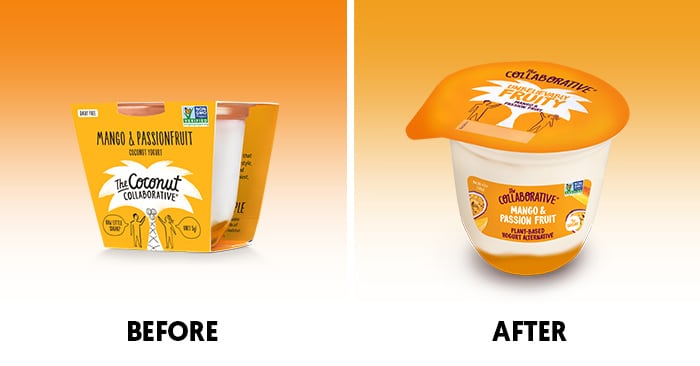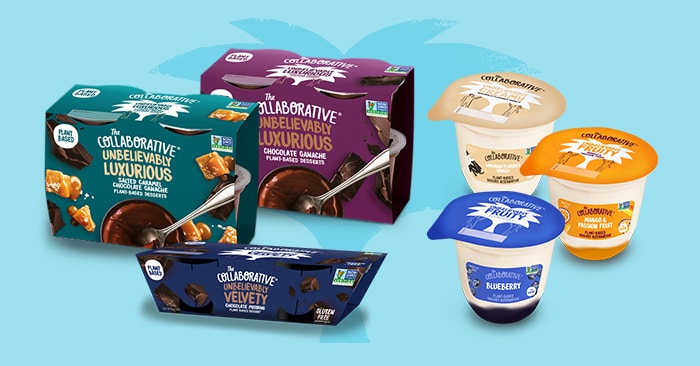“The Collaborative” Raises Money, Brings on New CEO

Plant-based dairy brand The Coconut Collaborative is pushing ahead to strengthen its position in the US market. Today the brand announced it had closed on a round of funding from PowerPlant Ventures, has brought on new US CEO Meiky Tollman, and that it is rebranding as The Collaborative.
PowerPlant’s $7 million investment closed in March and backs both The Collaborative’s European and North American arms. As part of the deal PowerPlant co-founder and partner Mark Rampolla will have a seat on the company’s board of directors.
Alongside the investment, The Collaborative has installed former Sabra executive, Meiky Tollman, as CEO of the North American business. Founder James Averdick will continue to run the European arm of the company, which will also handle R&D for the combined entity.
Averdick is the founder of UK-based dessert business Gü, which he sold in 2010 for over £32 million. In 2014 Averdick acquired the majority of Bessant and Drury, a small non-dairy European ice cream company, which subsequently evolved into the Coconut Collaborative. After launching a slate of new products overseas, the company began focusing on a US expansion in 2018
PowerPlant had been monitoring the brand since it first entered the states, Rampolla said, but wanted to see more of a focus on the US market. Key to the deal closing, he added, was Tollman, who had been consulting with the company since late last year before coming on board as CEO in March.
“Part of our thesis is that it takes maniacal focus to win at anything. So to try to win in the UK and the US was not something that we would typically be able to underwrite,” Rampolla said. “[We’re] fundamentally interested in big categories and fantastic brands, but at the end of the day it’s about execution and that takes experience and knowledge, tenacity and Meiky just struck us as extraordinary.”

Tollman served as general manager of the hummus and dip maker from 2004 to 2007, helping the brand expand into the US market and grow to $100 million in revenue. As COO from 2008 to 2013 he supervised the construction of a factory in Virginia and watched revenue grow to $500 million. After departing Sabra, Tollman said he decided to look for a company where he could be involved in its “building stages.”
The Collaborative will follow a similar plan for production. For now, the company will continue to produce products in Europe and import them into North America.
“The recipe is the easy part. But it’s really the process we use,” Tollman said. “The decision was to focus on building the business with the best quality product in the US and when we become bigger, either buy a factory and build it our way or find a co-packing partner.”
The company currently has six SKUs in the US: four single-serve yogurt cups in Plain, Vanilla, Blueberry and Mango Passion Fruit, and two rich chocolate puddings. By year-end, the portfolio will include nine new products, including multiserve tubs of yogurt, two sizes of rice pudding, a lighter chocolate pudding and chocolate mousse cups.
Currently all Collaborative products are made with coconut, but that will evolve over time, hence the need for a name change. While the US market will see new packaging roll out first, eventually European offerings will also transition over.
New products currently being explored include a higher-fiber offering that includes oats as well as a higher protein yogurt that may include legumes such as fava bean protein. Tollman said he is particularly enthusiastic about a new indulgent fruit dessert, codenamed “Netflix” because, he said, of its binge-ability.
The brand’s frozen chocolate lava cake and cheesecakes, which have been shown at past trade shows, will be put on the back burner for now, Tollman said, as The Collaborative focuses on building a brand block in the chilled dairy case.
The brand’s products are currently in 1,000 stores, including select locations of Bristol Farms, Whole Foods, Fresh Thyme, Wegman’s The Fresh Market, Safeway, Stop & Shop, Target. Nevertheless, he said, the company lacks a strong strategic retail partner to take the brand nationwide and “will go with us to create together.”
















